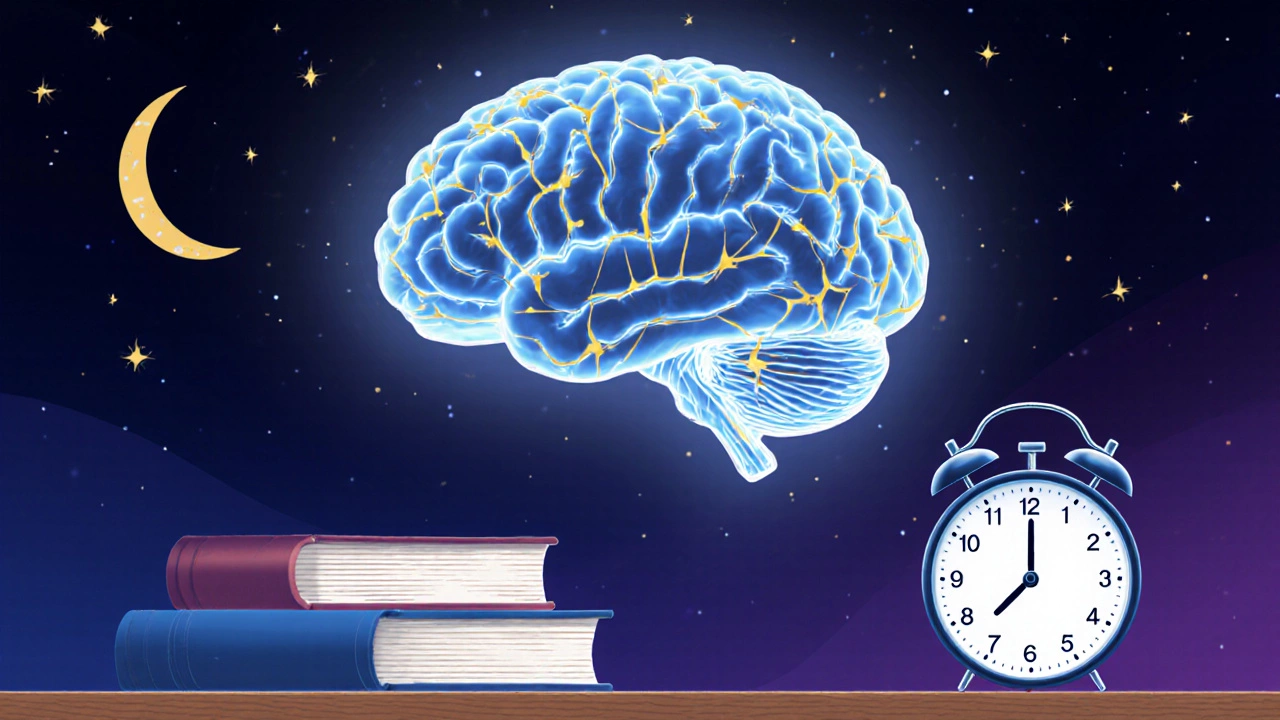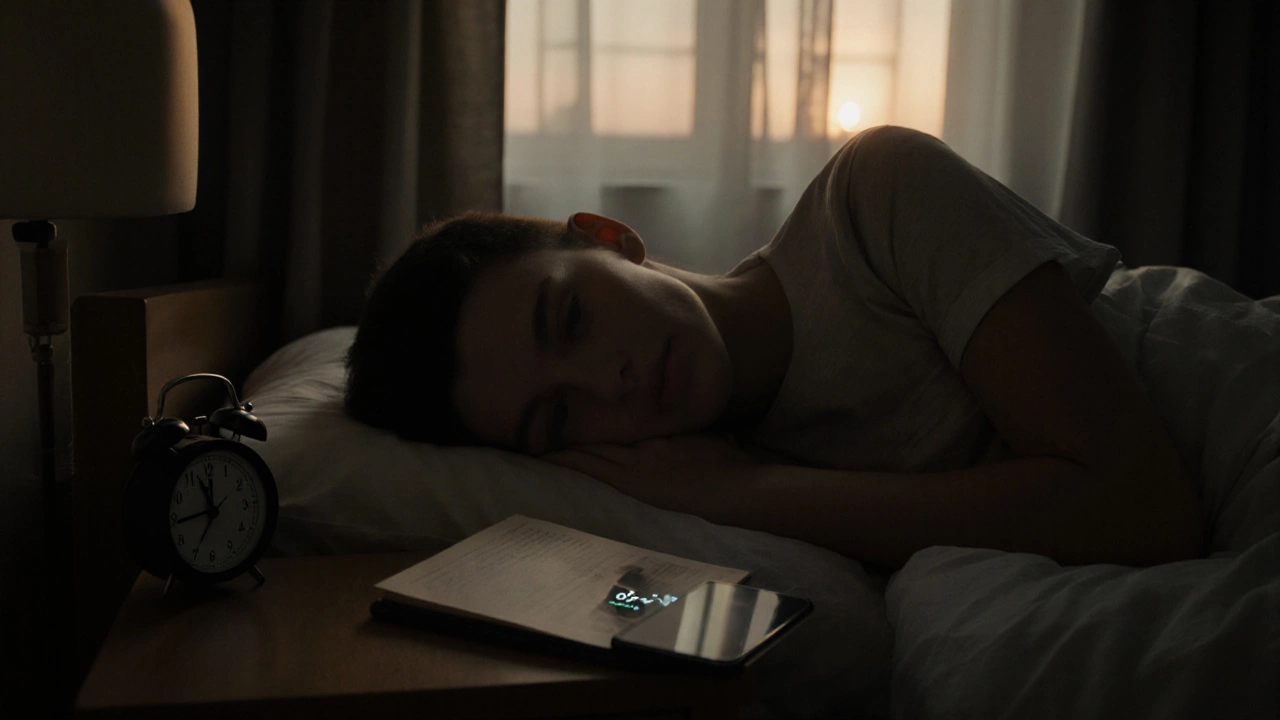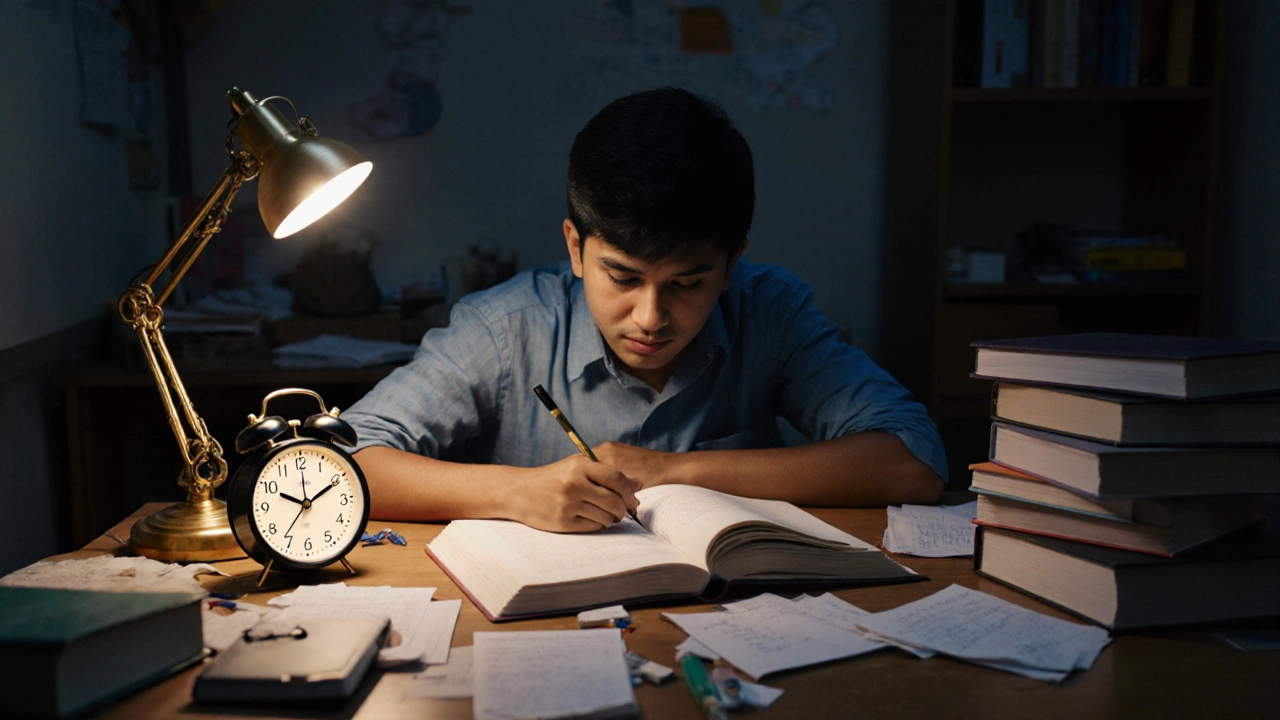JEE Sleep Needs Calculator
How Much Sleep Do You Really Need?
Find your optimal sleep amount based on your study schedule and performance.
Enter your study and sleep hours to see your personalized recommendation.
Every JEE aspirant knows the pressure. You’ve got 12 hours of study ahead of you, a stack of physics problems, chemistry formulas to memorize, and math papers that never seem to end. So you skip sleep. Again. You tell yourself, just one more chapter, then I’ll rest. But here’s the truth: sleep isn’t the enemy of your JEE prep-it’s your secret weapon.
Why Sleep Isn’t a Luxury for JEE Aspirants
Most students think sleep is something you cut when deadlines loom. But research from the National Sleep Foundation shows that students who sleep less than 6 hours a night during intense study periods score up to 25% lower on retention tests than those who get 7-8 hours. That’s not a small gap-it’s the difference between clearing JEE Main and missing the cutoff by 10 marks.
Your brain doesn’t just rest during sleep. It sorts, files, and strengthens everything you learned that day. When you study organic reactions at 10 PM and sleep for 5 hours, your brain spends the next few hours replaying those reactions, linking them to mechanisms you learned last week. Skip sleep, and that connection never forms. You’ll feel like you’ve studied hard-but you won’t remember half of it.
How Much Sleep Do You Actually Need?
There’s no magic number, but for JEE aspirants, 7 to 8 hours is the sweet spot. Not 5. Not 6. Seven to eight. That’s the range most top performers stick to-even during mock test weeks.
Think about it: if you’re studying 10-12 hours a day, you’re burning through mental energy faster than a smartphone on 5G. Your focus, problem-solving speed, and ability to catch small mistakes all drop sharply after 14 hours of wakefulness. A 2023 study from IIT Delhi tracked 412 JEE aspirants over six months. Those who slept 7.5 hours on average scored 18% higher in full-length mocks than those averaging 5.5 hours-even though the latter group studied 2 more hours daily.
It’s not about quantity alone. Quality matters too. Sleeping from 11 PM to 6:30 AM gives your brain the deep sleep cycles it needs between 12 AM and 4 AM. That’s when memory consolidation peaks. If you’re sleeping at 2 AM and waking at 8 AM, you’re missing the most critical window.
What Happens When You Skimp on Sleep?
Let’s say you’re pulling an all-nighter to finish a mock test. You finish at 5 AM. You feel proud. But here’s what your brain is really doing:
- Reduced focus: Your attention span drops to that of a 12-year-old. You re-read the same question three times.
- Slower recall: You forget formulas you memorized yesterday. The one you wrote on your wall? Gone.
- Emotional overload: Small mistakes make you snap. You cry over a wrong answer. You yell at your sibling for turning on the light.
- Impaired decision-making: You start guessing blindly on easy questions because your brain can’t weigh options anymore.
And here’s the kicker: sleep deprivation makes you think you’re fine. You feel alert. You’re still typing. But your brain is running on fumes. It’s like driving a car with a half-empty tank and thinking you’ve got enough to reach Delhi.

How to Build a Sleep-Friendly JEE Schedule
You don’t need to study less. You need to study smarter. Here’s how to structure your day:
- Wake up at the same time every day-even on weekends. Your body thrives on routine. If you wake at 6 AM Monday through Friday, don’t sleep till 9 AM on Sunday.
- Study in 90-minute blocks. After each block, take a 15-minute break. Walk, stretch, look out the window. Don’t scroll Instagram.
- Stop studying by 11 PM. Your brain needs 60-90 minutes to wind down before sleep. Reading physics at 11:30 PM means you won’t fall asleep until 1 AM.
- Turn off screens 45 minutes before bed. Blue light suppresses melatonin. Use a physical alarm clock. Read a book instead.
- Keep your room cool and dark. Temperature matters. Ideal sleep zone: 18-20°C. Use blackout curtains. Silence your phone.
One student from Kota, who scored 99.8 percentile, told his mentor: “I used to sleep 5 hours. Then I started sleeping 7.5. My mock scores jumped 40 marks. I didn’t study more. I just rested better.”
What About Short Naps?
Naps aren’t cheating. They’re recovery. A 20-30 minute power nap after lunch can reset your focus for the evening. But avoid naps after 4 PM-they’ll mess up your nighttime sleep.
Try this: after lunch, set a 25-minute timer. Lie down. Don’t check your phone. Let your mind go quiet. When the alarm goes off, you’ll feel like you’ve hit the reset button.

When Sleep Is the Only Thing Holding You Back
Some students say, “I can’t sleep more-I have too much to cover.” But here’s the reality: you’re not covering more. You’re covering the same material slower, with more mistakes, and forgetting it faster.
Think of your brain like a hard drive. If you keep writing new files without clearing the cache, it slows down. Sleep is the cleanup process. Skip it, and eventually, your system crashes.
If you’re exhausted, overwhelmed, or emotionally drained, sleep isn’t the problem-it’s the solution. The JEE doesn’t test how many hours you sat at your desk. It tests how clearly you think under pressure. And clarity comes from rest.
Real-Life Example: The 6-Hour Myth
Meet Rohan. He studied 14 hours a day for 8 months. Slept 6 hours. His mocks hovered around 85 percentile. He was frustrated. He blamed the syllabus. He blamed the coaching.
Then he changed one thing: he started sleeping 7.5 hours. He cut his study time by 90 minutes. He didn’t skip a single topic. He just stopped studying after 11 PM. He took a 20-minute nap after lunch.
Three months later, his mock scores jumped to 98.2 percentile. He cleared JEE Advanced with an All India Rank of 317.
He didn’t get smarter. He just gave his brain what it needed to work at full capacity.
Final Thought: Sleep Is Part of the Syllabus
You wouldn’t skip a chapter in Physics or skip practicing calculus. So why treat sleep like an optional extra? It’s not. It’s a core part of your preparation strategy. Treat it like you treat your NCERT textbook-non-negotiable, daily, essential.
Forget the hype about geniuses who sleep 4 hours. Those are outliers. The real winners? The ones who show up every day, sharp, focused, and well-rested.
So tonight, close your book 30 minutes earlier. Turn off the light. Let your brain do the work it was built to do. Tomorrow, you’ll be ready-not just to study more-but to understand more, remember more, and solve more.
Is 6 hours of sleep enough for a JEE aspirant?
Six hours is the absolute minimum, but it’s not enough for consistent high performance. Most top scorers get 7-8 hours. Sleeping only 6 hours reduces memory retention, increases mistakes, and lowers problem-solving speed. You might feel fine in the short term, but over weeks, your scores will drop even if you study longer.
Should I sleep before or after studying at night?
Sleep after studying. Your brain consolidates memories during sleep, especially in the first 3-4 hours. If you study at night and then sleep, your brain will replay what you learned. If you stay up, that process gets interrupted. Never pull an all-nighter right after a heavy study session.
Can I make up for lost sleep on weekends?
Not fully. Sleeping in on weekends disrupts your circadian rhythm and makes it harder to fall asleep Sunday night. You’ll feel groggy Monday morning. Consistency matters more than recovery. Aim for the same sleep schedule every day-even on rest days.
Does caffeine affect my sleep during JEE prep?
Yes. Caffeine stays in your system for 6-8 hours. If you drink coffee after 3 PM, it will delay your sleep onset and reduce deep sleep quality. Switch to herbal tea or water after lunch. If you need energy, take a walk instead of another cup.
What if I can’t fall asleep even after 30 minutes?
Get out of bed. Go to another room, sit quietly in dim light, and read something calm-no screens. Don’t force sleep. Stressing about it makes it worse. Return to bed only when you feel sleepy. This trains your brain to associate your bed with sleep, not stress.
Is it better to study late at night or wake up early?
It depends on your natural rhythm. But for most people, studying between 7 AM and 11 PM is more effective than 11 PM to 4 AM. Your brain is sharper in the morning after a full night’s rest. Late-night studying often leads to lower retention and higher stress. If you’re a night owl, shift your schedule gradually-don’t force yourself to wake at 5 AM if your body isn’t ready.

